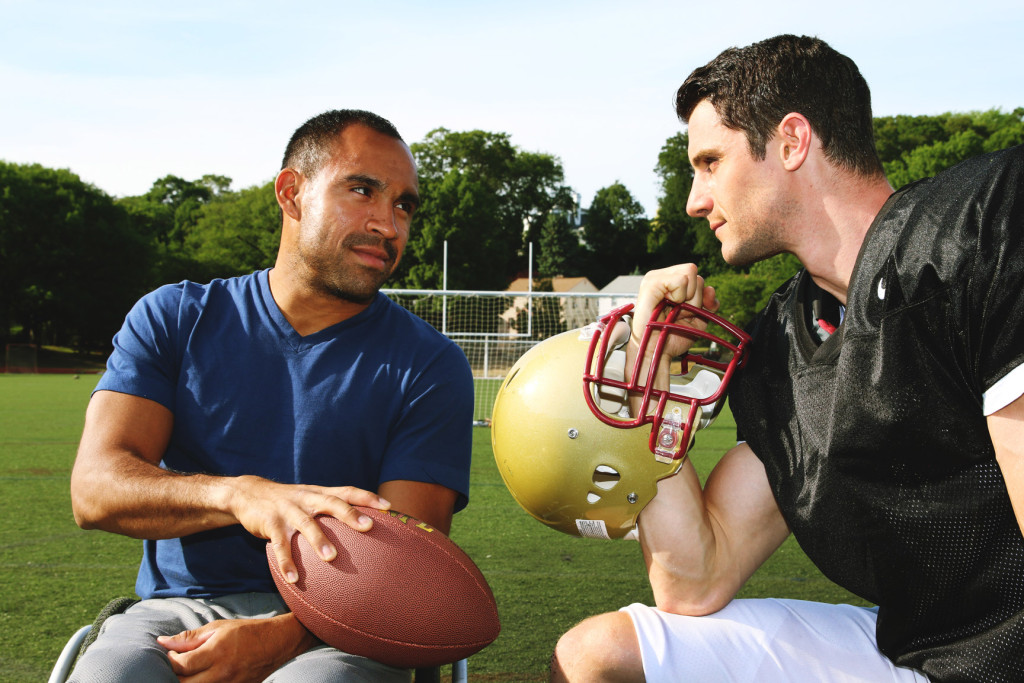
Marlon Shepard as Mike and Alex Molina as Young Mike. (Photo by Mona Maruyama)
Presented by Company One
An NNPN Rolling World Premier
Play by Andrew Hinderaker
Directed by Summer L. Williams
July 17 – August 15
Roberts Studio Theater at the BCA
527 Tremont St, Boston, MA
Company One on Facebook
Review by Danielle Rosvally
(Boston, MA) I’m not really a football fan. Much to the chagrin of my darling beloved, I have a hard time sitting through anything sports-related, and being forced to watch several hours worth of men chasing a ball for no apparent reason sounds like hell to me. But that, thankfully, did not prevent me from enjoying (almost) every minute of Company One’s Colossal.
The play is a rolling world premier (which means that over the course of the year it will be debuted in several cities for the first time), and I can’t recall ever seeing anything quite like it in Boston. Company One has transformed the Roberts Studio Theatre into a football field complete with turf, uprights, and a locker room. If you’re seated in the front row, expect to be part of the action; your feet will be on the green and (if you don’t keep your bits tucked) you may just wind up brushing by an actor during one of their lengthy physical intervals. The traverse stage is a unique and daring approach to tackling theatre; one that most companies shy away from due to its demanding physical constraints upon the actors. Never did I once feel that I was missing out on an emotional moment because of sightlines; director Summer Williams has deftly managed the difficult layout with gusto.
The company is strong in more ways than one; lifting, squatting, tackling, and dancing their way through the performance. The emotional life of the characters is (for the most part) real and deep with a few minor exceptions; choreographer/actor Tommy Neblett definitely got those boys to dance, but lacked some connection in his intense and complicated role. Marlon Shepard and Alex Molina as Mike and Young Mike respectively played each other (themselves?) with an intensity that allowed the audience to bridge the gap of time between the two characters and fuse them together into a complicated mélange of personhood.
The play asks some real questions about time and self: who are we, and how does that relate to who we become? Are we ourselves, or the stories we tell about ourselves? Since time is a character onstage (literally brought to life by a scoreboard visible for the duration of the piece that counts down each 15-minute quarter second by second), the play’s sometimes unintuitive time leaps take on new life. A modern memory play, Colossal makes an audience question the ability of our own agency; can we change or stop time? Can we truly relive the moments that create us? Or are we doomed to a nihilistic existential crisis of living that only allows us to repeat actions as we know them?
There are some very complicated relationships at play in Colossal; teammates, doctor/patient, father/son, coach/athlete, athlete/sport, lovers, friends, comrades… all are played adeptly by the incredibly talented ensemble.
For all of its glowing virtues, I recognized two flaws in the performance: the first has to do with the show’s structure. Broken into four fifteen-minute quarters, the play is performed with a half-time show at the halfway mark. The halftime show, also fifteen minutes, dragged on far longer than it needed to. While the show was spectacular with a live drum line and modern dance routine, it was inconveniently placed within the play’s action. At the halfway mark, we as an audience were just getting used to the characters and beginning to invest in the story when it came to a grinding halt for us to witness something which, while spectacular, was also completely unnecessary. Trimming the halftime show would have definitely given the play more momentum and kept the audience more with the story of the characters.
The second flaw has to do with Company One’s hiring practices. Colossal is an intensely physical show with several moments of conflict between actors, including fully-staged football tackles, falls, and gymnastic feats. Despite this, the company hired no fight director for the performance; and it showed. I admit that my own background makes me hyper-sensitive to this issue, but I witnessed several incidents of unsafe falling and actor on actor violence which could have been fixed with one afternoon in the presence of a professional fight director. I couldn’t help but spend a good third of the performance desperately concerned for the actors’ safety in executing what the show demanded of them. This is a pattern I have noticed with Company One, and a pattern that I hope the company will seek to remedy. Actor safety needs to come first. Until Company One hires the correct industry professionals to train their actors in the often demanding work they do, they are demonstrating a disregard for this safety that is (frankly) shocking. I hope that they will consider themselves lucky should they complete this run without injury and consider remedying this attitude in the future.
In spite of these flaws, I thoroughly enjoyed the show and would recommend that anyone with an interest in sports, football, or human connection take the time to go see it.
